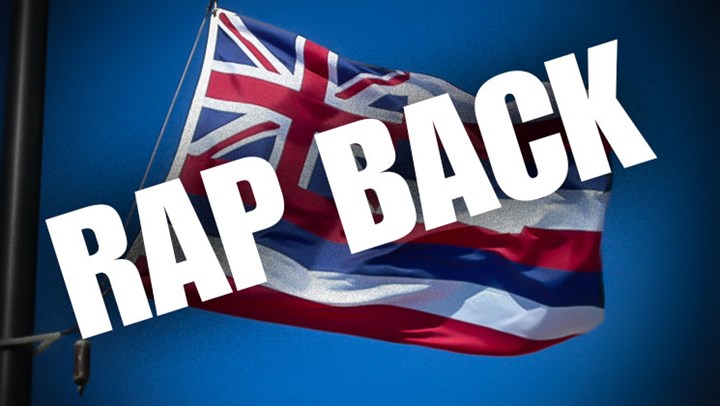
by Kat Ainsworth - Thursday, September 8, 2016

Hawaii’s “Aloha spirit” clearly does not extend to gun owners and hunters. Already one of the strictest gun control states in the nation, on June 23 Hawaii became the first state to place its law-abiding gun owners into a new federal registry as Gov. Ige signed Senate Bill 2954 and House Bill 2629 into law. The laws provide for tracking gun owners’ activities and lay the groundwork for potential confiscation. Gov. Ige also signed Senate Bill 2647 banning the import, sale, purchase, barter and possession for the purpose of selling any ivory, whether mammoth ivory, rhinoceros horn or any other ivory product.
SB 2954 makes Hawaii the first state in the country to begin compiling a federal database of law-abiding gun owners. The NRA’s Institute for Legislative Action (NRA-ILA) was quick to respond tweeting “Exercising constitutional rights in #Hawaii now gets you entered into a federal watchlist, er, database.”
Hawaii’s new law requires current and future gun owners to register in the FBI’s “Rap Back” system. The FBI calls it their Next Generation Identification Program, which is currently used to track the actions of people who are part of ongoing criminal investigations. If someone enrolled in the database has contact with law enforcement, an alert is issued through the FBI. Now the program will be used to track the actions of all law-abiding gun owners in Hawaii—and not just residents. SB 2954 requires law enforcement to request a “Rap Back” on anyone requesting a firearm license or registering a firearm. Translation: Hunters who intend to visit Hawaii to hunt will find themselves enrolled in an FBI database meant for criminals.
Two other additions to the state’s gun control legislation are found in House Bill 2629. One prohibits anyone convicted of certain stalking offenses from owning firearms. The other requires law-abiding gun owners who have been diagnosed with “a significant behavioral, emotional or mental disorder, or due to emergency or involuntary admission to a psychiatric facility” to surrender their firearms and ammunition. If they do not comply, their local police chief can seize the guns and ammo.
Claims have been made to the effect that the new laws are about the “community’s safety and responsible gun ownership” and merely ensure the security of Hawaii residents and visitors. However, it is clear Hawaii has become the first state to enable a federal registry of lawful gun owners, tracking their movements and laying the groundwork for confiscation.
Hawaii's Anti-Gun, Anti-Hunting History
If you are not aware of Hawaii’s anti-gun, anti-freedom history, here are a few facts. For starters, using a firearm to defend yourself could possibly place you in legal jeopardy. Hawaii is one of the minority of states that impose a “duty to retreat” before using a firearm in self-defense. If you can retreat, the law requires you to do so. If you don’t, be prepared to explain why you didn’t to a judge or jury who will assess your split second life-or-death decisions in the comfort of a secure courtroom. If you can defend yourself using other methods, Hawaii prefers you use them. And, perhaps most surprising of all, the law requires a person acting in self-defense to “surrender a thing” to or “[comply] with a demand” from an assailant before using a firearm in self-defense.
Of course, it’s difficult to defend yourself with a firearm if you don’t own one—let alone have the option to carry a handgun on your person. Hawaii residents must apply to the chief of police for permits to acquire handguns and for permits to carry them. Paramount to the process of getting a carry permit is the requirement to prove a threat exists, causing reason to fear injury or death. Clear threats include documented domestic violence or assault cases. It involves, among other things, authorizing access to medical records, three trips to the police station and two trips to the local gun store. Hopeful applicants admit waiting as many as nine hours in line at the police station with some camping out overnight to be first in line. However, in 2006 a reporter confirmed it had been 15 years since a private citizen was issued a carry permit.
Long guns are a bit easier to obtain, though still not simple. No firearms can be purchased in the state without first acquiring a permit from local law enforcement. And, thanks to SB 2954, applicants for permits to acquire long guns, like all other gun owners in Hawaii, will be placed in a federal biometric registry of gun owners.
Hunting in the Aloha State is also carefully regulated. Non-residents must show proof of completing an approved hunter safety course, something the state mandates for “all applicants” rather than exempting hunters of certain ages. Don’t have a hunter’s education card? You’ll have to get one before applying for a Letter of Exemption from having a Hawaii Hunter’s Education card and then applying for your hunting license. If you do get a license and fly in for a hunt, you are required to register your long gun with local law enforcement within 5 days.
Food for Thought
States legislatures that are controlled by anti-gun politicians often serve as a test-bed for gun-control activists’ latest restrictive policies. Hawaii’s decision to subject law-abiding gun owners and hunters to a federal watchlist designed for criminals should serve as a stark reminder to all gun owners or simply those who value freedom and privacy that gun-control proponents will stop at nothing to achieve their anti-freedom ends.
E-mail your comments/questions about this site to:
[email protected]
Proudly supported by The NRA Foundation and Friends of NRA fundraising.
